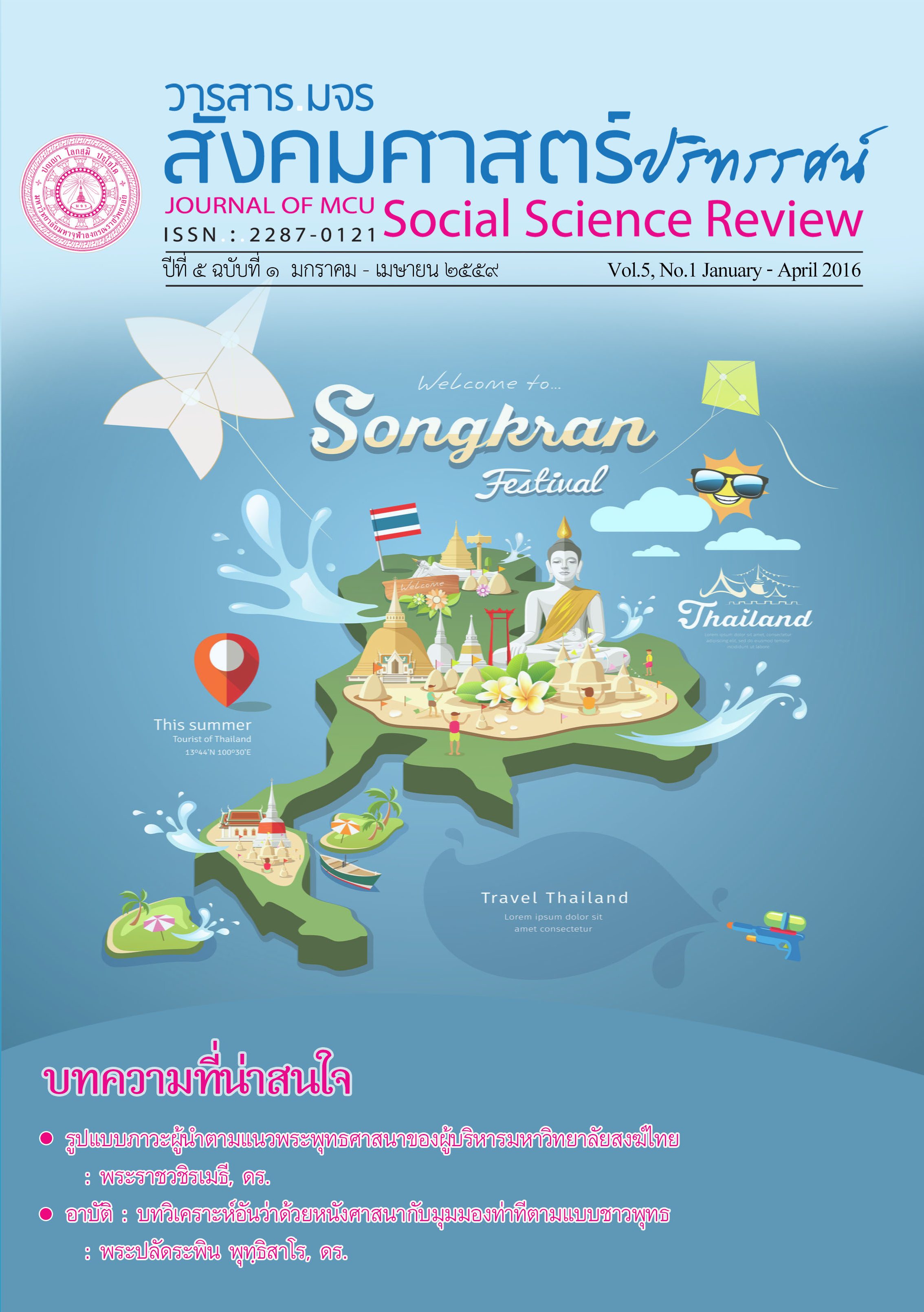รูปแบบภาวะผู้นำตามแนวพระพุทธศาสนาของผู้บริหารมหาวิทยาลัยสงฆ์ไทย
คำสำคัญ:
รูปแบบ, ภาวะผู้นำ, ผู้บริหารมหาลัยสงฆ์บทคัดย่อ
บทความวิจัยฉบับนี้มีวัตถุประสงค์ ๓ ข้อ คือ ๑) เพื่อศึกษาสภาพทั่วไปของภาวะผู้นำตามแนวพระพุทธศาสนาของผู้บริหารมหาวิทยาลัยสงฆ้ไทย ๒) เพื่อศึกษาหลักพุทธธรรมที่ส่งเสริมภาวะผู้นำตามแนวพระพุทธศาสนาของผู้บริหารมหาวิทยาลัยสงฆ์ไทย ๓) เพื่อนำเสนอรูปแบบภาวะผู้นำตามแนวพระพุทธศาสนาของผู้บริหารมหาวิทยาลัยสงฆ์ไทย ผลการวิจัยพบว่า ๑. ศึกษาสภาพทั่วไปของภาวะผู้นำตามแนวพระพุทธศาสนาของผู้บริหารมหาวิทยาลัยสงฆ์ไทยโดยภาพรวมมีค่าเฉลี่ยอยู่ในระดับมาก, เมื่อพิจารณารายละเอียดพบว่า ยังมีระดับคะแนนอยู่ในระดับมากทุกมิติโดยประเภทที่มีควาเฉลี่ยสูงได้แก่ ด้านวิสัยทัศน์ ผู้นำกำหนดทิศทางที่จะดำเนินงานขององค์กร โดยมีจุดหมายปลายทางที่ชัดเจนและมีส่วนรวมในการบริหารจัดการ ด้านความชำนาญ ผู้นำมีความตั้งใจอดทน ต่อสภาพปัญหาอันเกิดจากการปฏิบัติงานในหน้าที่ที่ได้รับมอบหมายอย่างเต็มความสามารถ ด้านมนุษยสัมพันธ์ ผู้นำให้ความช่วยเหลือผู้อื่นเมื่อมีโอกาส และตรวจสอบงานที่มอบหมาย เพื่อให้งานมีประสิทธิภาพ ๒. ศึกษาหลักพุทธธรรมที่ส่งเสริมภาวะผู้นำตามแนวพระพุทธศาสนาของผู้บริหารมหาวิทยาลัยสงฆ์ไทย พบว่ามี ๓ ด้าน คือ ด้านวิสัยทัศน์ คือ จักขุมา หมายถึง การมีสายตายาวไกลในการบริหารงาน มีหลักสัปปุริสธรรม ๗ ส่งเสริมสนับสนุน ด้านความชำนาญ คือ วิธูโร หมายถึง การบริหารการจัดการมีทักษะ เชี่ยวชาญเฉพาะด้าน มีหลักอิทธิบาท ๔ ส่งเสริมสนับสนุน และด้านมนุษยสัมพันธ์ คือ นิสสยสัมปันโน หมายถึง การมีมนุษยสัมพันธ์ มีหลักสังคหวัตถุ ๔ ส่งเสริมสนับสนุน ซึ่งเป็นปัจจัยสำคัญต่อการส่งเสริมภาวะผู้นำของผู้บริหาร ซึ่งองค์ประกอบทั้ง ๓ ดังกล่าวนั้น จะนำไปสู่การส่งเสริมผู้บริหารมหาวิทยาลัยสงฆ์ไทยให้มีประสิทธิภาพยิ่งขึ้น ๓. สำหรับการนำเสนอรูปแบบภาวะผู้นำตามแนพระพุทธศาสนาของผู้บริหารมหาวิทยาลัยสงฆ์ไทยพบว่า การที่ผู้นำกำหนดทิศทางที่จะดำเนินงานขององค์กร โดยมีจุดหมายปลายทางที่ชัดเจนและมีส่วนรวมในการบริหารจัดการ ก็จะเป็นผู้นำที่สร้างความแข็งแกร่งให้องค์การด้วยการสร้างทีมงานที่มีการวางแผนการปรับปรุงการทำงานอย่างมีเหตุผลรัดกุม รอบคอบ ส่งผลให้ผู้นำให้ความช่วยเหลือผู้อื่นเมื่อมีโอกาส และตรวจสอบงานที่มอบหมาย เพื่อให้งานมีประสิทธิภาพ และผู้นำต้องมีความตั้งใจอดทนต่อสภาพปัญหาอันเกิดจากการปฏิบัติงานในหน้าที่ที่ได้รับมอบหมายอย่างเต็มความสามารถ นำไปสู่การส่งเสริมการบริหารมหาวิทยาลัยสงฆ์ไทยให้ดียิ่งขึ้น
เอกสารอ้างอิง
(๑) หนังสือ:
ฉันทนา จันทร์บรรจง รศ.ดร. จิตตวิทยาการบริหาร. พิษณุโลก : โรงพิมพ์บุญรอดเปเปอร์ เนติกุลการพิมพ์, ๒๕๔๒.
นิพนธ์ กินาวงศ์. รศ.ดร.. หลักการบริหารการศึกษา. ภาควิชาการบริหารและพัฒนาการศึกษามหาวิทยาลัยนเรศวร, ๒๕๔๒.
พระพิพิธธรรมสุนทร (สุนทร ญาณสุนฺทโร). คติธรรมนำชีวิต. กรุงเทพมหานคร : เลี่ยงเชียง,๒๕๔๖.
สงวน นิตยารัมภ์. ภาวะผู์นำกับวิกฤติระบบราชการไทย. กรุงเทพมหานคร : สำนักพิมพ์มติชน,๒๕๔๑.
(๒) วารสาร
พรทิพย์ อัยยิมาพันธ์. Leadership for Organizational Effectiveness, วารสารการบริหารคน,มีนาคม, ๒๕๔๗.
(๓) วิทยานิพนธ์/รายงานวิจัย
กัลยรัตน์ เมืองสง. “รูปแบบการพัฒนาภาวะผู้นำเชิงกลยุทธ์ของผู้บริหารสถานศึกษาขั้นพื้นฐาน”.ปริญญาการศึกษาดุษฎีบัณฑิต. บัณฑิตวิทยาลัย : มหาวิทยาลัยบูรพา, ๒๕๕๐.
พระศรีวชิราภรณ์, “มหาจุฬาฯ ได้อะไรจากการประเมินภายนอก”, ใน สารนิพนธ์พุทธศาสตรบัณฑิต รุ่นที่ ๑๕ ปีการศึกษา ๒๕๔๗. มหาวิทยาลัยมหาจุฬาลงกรณราชวิทยาลัย,๒๕๔๗.
(๔) สื่ออิเล็กทรอนิกส์/เว็บไซต์:
มหาวิทยาลัยมหามกุฏราชวิทยาลัย. “ประวัติความเป็นมา., [ออนไลน์], แหล่งที่มา:http://www.mbu.ac.th/index.php/2012-11-14-02-09-47/2012-11-14-02-25-
, หน้า ๑. (๑๑ ธ.ค.๕๖)
อรฤทัย ผกาขยาย. บทบาทของผู้นำที่ได้ชื่อว่าเป็นผู้นำที่ดี. ออนไลน์, แหล่งที่มา:http://www.bloggang.com/viewdiary.php?id=anotherside&month=๐ 2 -
&date=09&group=27&gblog=285. [๒๐ กันยายน ๒๕๕๔].
๒. ภาษาอังกฤษ
(I) Books:Stogdill Ralph M. Handbook of Leadership : A Survey of Theory and Research.New York : McGraw - Hill, 1974. Yamane, Taro. Stratistics : an Introductory Analysis. 2nd ed.. New York : Harperand Row, 1967.
ดาวน์โหลด
เผยแพร่แล้ว
รูปแบบการอ้างอิง
ฉบับ
ประเภทบทความ
สัญญาอนุญาต
ลิขสิทธิ์ (c) 2016 วารสาร มจร สังคมศาสตร์ปริทรรศน์

อนุญาตภายใต้เงื่อนไข Creative Commons Attribution-NonCommercial-NoDerivatives 4.0 International License.
เพื่อให้เป็นไปตามกฎหมายลิขสิทธิ์ ผู้นิพนธ์ทุกท่านต้องลงลายมือชื่อในแบบฟอร์มใบมอบลิขสิทธิ์บทความให้แก่วารสารฯ พร้อมกับบทความต้นฉบับที่ได้แก้ไขครั้งสุดท้าย นอกจากนี้ ผู้นิพนธ์ทุกท่านต้องยืนยันว่าบทความต้นฉบับที่ส่งมาตีพิมพ์นั้น ได้ส่งมาตีพิมพ์เฉพาะในวารสาร มจร สังคมศาสตร์ปริทรรศน์ เพียงแห่งเดียวเท่านั้น หากมีการใช้ภาพหรือตารางหรือเนื้อหาอื่นๆ ของผู้นิพนธ์อื่นที่ปรากฏในสิ่งตีพิมพ์อื่นมาแล้ว ผู้นิพนธ์ต้องขออนุญาตเจ้าของลิขสิทธิ์ก่อน พร้อมทั้งแสดงหนังสือที่ได้รับการยินยอมต่อบรรณาธิการ ก่อนที่บทความจะได้รับการตีพิมพ์ หากไม่เป็นไปตามข้อกำหนดเบื้องต้น ทางวารสารจะถอดบทความของท่านออกโดยไม่มีข้อยกเว้นใดๆ ทั้งสิ้น





